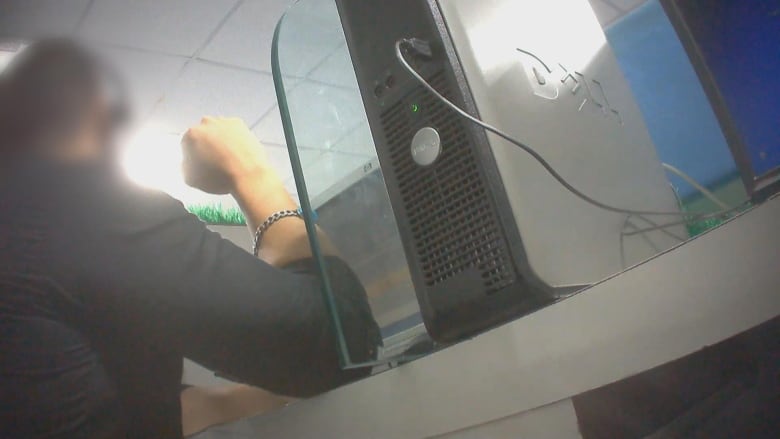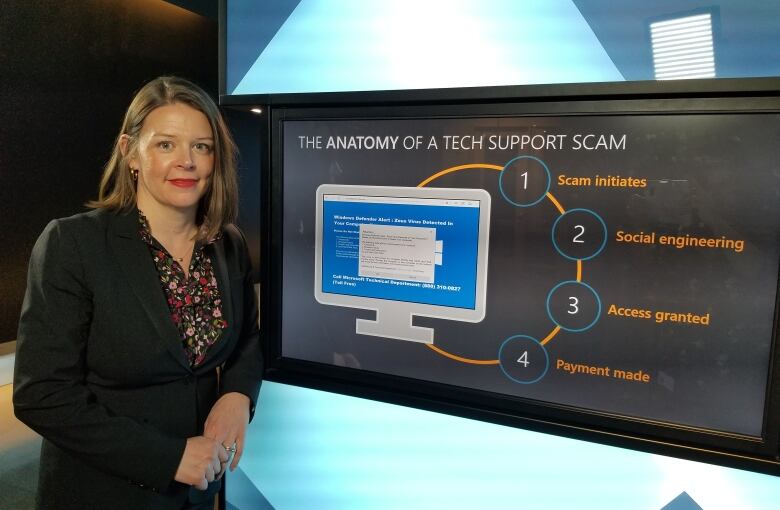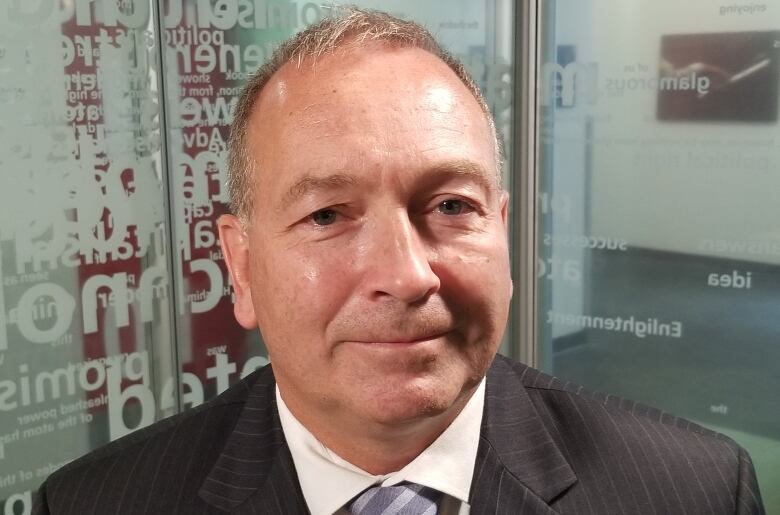How we got inside an overseas tech support scam targeting Canadians
RCMP 'applauds' Marketplace's efforts, says 'more action is coming'

Inside the office where a call centre had been scamming Canadians, the workers didn't see the CBC Marketplace crew coming. Sitting in a low-rise building along a busy Mumbai street, they froze when confronted by journalists demanding to know why they had been intimidatingvulnerable Canadians on the other side of their world.
Everything stopped. Calls ended abruptly. None of the workers spoke. Their faces were clearly stunned at what may have been the first-ever intrusion into an operation that has existed openly, but largely without interference from law enforcement.
Marketplace's efforts to locate those behind the tech support scam spanned months, including cultivating a relationship with someone inside the operation; it ended ina late-night dash up three flights of stairs into the call centre.
Tech support scams which involve fraudsters posing as support staff, oftentimes from legitimate well-known companies, like Microsoft, Google or Apple are nothing new. But they continue to plague North Americans, bilking people of millions each year.
"Around the globe, we found that two out of three people had experience with the tech support scam," said Microsoft's chief digital safety officer, Courtney Gregoire, whose company is frequently named in the scammers' online pop-ups or phone calls.

"I used to take out $3,000 from Canadian and [American] pockets every day," said Puneet Malik. Until recently, he worked inside one of the many overseas call centres, demanding payment from unsuspecting Westerners.
"My pitch used to start with $200, so that basically means at least they will be giving $200 if they want their computer back ... It's a scare tactic."
How it works
Instilling fear in would-be victims is a common ingredient for overseas callcentres. Those on the receiving end might be threatened with arrest or prosecution for having illicit or illegal material on their computers, purportedly installed by phantom foreign sources. At the very least, loss of computer functionality is suggested.
None of it is true.
Watch: Marketplace allows the scammers to take over a computer:
The tech support scam may be one of India's largest, but it is accompanied by similar scams the tax scam, the payday loan scam or the immigration scam, among others run out of similar centres, often using the same employees.
The tech support scam plays out in three main ways:
-
Pop-ups: A pop-up window appears on your screen, warning your computer is at risk or infected by a virus. The window which can be intrusive and difficult to close directs users to call a toll-free number for assistance.
-
Phoney search engine results: Scammers try to get their websites and phone numbers to appear on Google or other search engines when users are seeking ways to repair a malfunctioning smartphone or computer. They may also buy ads to promote their "support."
-
Cold calls: Scammers call potential victims directly, convincing them that their computer or phone has been identified as one that is infected and the only fix is to pay for clean-up.
When Nahid Philipos's phone stopped working, an online search for "iPhone support" ended with her unknowingly on the line with a scammer. He was convincing, she said, keeping her on the line as she followed his instructions and bought $3,000 worth of iTunes gift cards.

"He said there are many problems on the phone. There are hackers from Russia, from China, from India and Brazil," Philipos recalled. "He said it's a complicated issue; it has to be minimum $3,000 to be able to do the transaction."
The scammer promised the money would be returned once the phone was fixed. It never was.
Money isn't necessarily the main goal
Figures from the Canadian Anti-Fraud Centre indicate just over $850,000 was extracted from Canadians by this one scam in 2018, down from more than $1.3 million the year before. But authorities acknowledge the true figure is likely much higher, as few report being victimized.
Most at risk are the elderly and new Canadians, who may not be familiar with how tech support operates in North America, or who may legitimately fear the repercussions threatened by the scammers, including arrest.
But money is not the scammers' only goal. They'll also try to seize control of a victim's computer, often by installing remote access software that can leave a permanent backdoor, allowing the scammers access to sensitive personal information, like banking transactions, tax filings, passwords and emails.
"We've had situations where ID has been taken out on people, and fake drivers' licences," said Ryan Duquette, a former fraud detective turned cybersecurity consultant.
"We've had situations where a For Sale sign has been posted on somebody's front yard without their knowledge of that even happening. So they've been able to steal their identity [and] take a mortgage out in their name. So it can be pretty scary when it gets stolen."
And once an individual has fallen for one scam, they are likely to be targeted by others. The fraudsters sell so-called lead lists for pennies, indicating who was taken, how much was stolen and which scam was used.
CBC's secret effort to find the scammers
While there was a flurry of raids and arrests at the end of 2018 against a number of Indian-based call centres, there has been no reported law enforcement action against the centres targeting Canadians in 2019.
So Marketplace worked with confidential sources to get inside a large Mumbai-based call centre to see if the 2018 arrests had done anything to curb these illicit activities.
It began by convincing a current employee to wear a hidden camera into the scam centre, where dozens of young men and women spend hours on the phones. The camera recorded various individuals making and receiving calls, co-ordinating access into home computers on the other side of the world and threatening those on the other end of the line.

Even when confronted by would-be victims on the phone, the scammers pushed back, seemingly unperturbed of any consequences.
"Do whatever you want to do," a scammer said in one recording. "You can report me to the Donald Trump as well, because we are not afraid of that, OK?"
One source told Marketplace he'd previously seen Indian police inside the call centre, being friendly with managers but taking no action to stop the fraudulent activities.
And yet after detailed surveillance on the building, a CBC crew was able to bolt up the stairs, past two doors that normally were locked and stand face-to-face with those on the phones.
They froze. A security guard at the front was speechless.
After asking why the group continued to scam vulnerable Canadians but getting no response the CBC crew left the building. This scam is big business and enforcers have been known to use weapons and violence to maintain their enterprise.
RCMP vows more action
In response to a growing number of complaints about overseas scams, the RCMP launched Project Octavia late last year, which seeks to work with Indian authorities to shut down these illegal call centres.
"We're making headway," said RCMP Supt. Peter Payne, with the national financial crimes division. "These investigations are quite complex and most of the perpetrators live in India. We have jurisdictional issues, so it's not as simple as us going over there and making the arrests, impacting the investigations."

The RCMP says more action is coming both in India and Canada, where potential accomplices may act as mules to move money back to the top scam bosses.
But public awareness is key, the RCMP says.
If you end up on a call like this, where someone is demanding payment over the phone to fix your computer, the advice is to hang up immediately. And never allow an unknown caller to gain remote access to or to install anything on your phone or computer.
With files from Luke Denne













_(720p).jpg)


 OFFICIAL HD MUSIC VIDEO.jpg)
.jpg)



























































































